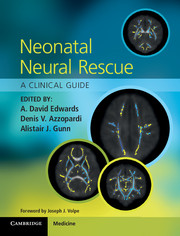Book contents
- Frontmatter
- Contents
- List of contributors
- Foreword
- Section 1 Scientific background
- Section 2 Clinical neural rescue
- 6 Challenges for parents and clinicians discussing neuroprotective treatments
- 7 The pharmacology of hypothermia
- 8 Selection of infants for hypothermic neural rescue
- 9 Hypothermia during patient transport
- 10 Whole body cooling for therapeutic hypothermia
- 11 Selective head cooling
- 12 Hypothermic neural rescue for neonatal encephalopathy in mid- and low-resource settings
- 13 Cerebral function monitoring and EEG
- 14 Magnetic resonance imaging in hypoxic–ischaemic encephalopathy and the effects of hypothermia
- 15 Novel uses of hypothermia
- 16 Neurological follow-up of infants treated with hypothermia
- 17 Registry surveillance after neuroprotective treatment
- Section 3 The future
- Index
- References
6 - Challenges for parents and clinicians discussing neuroprotective treatments
from Section 2 - Clinical neural rescue
Published online by Cambridge University Press: 05 March 2013
- Frontmatter
- Contents
- List of contributors
- Foreword
- Section 1 Scientific background
- Section 2 Clinical neural rescue
- 6 Challenges for parents and clinicians discussing neuroprotective treatments
- 7 The pharmacology of hypothermia
- 8 Selection of infants for hypothermic neural rescue
- 9 Hypothermia during patient transport
- 10 Whole body cooling for therapeutic hypothermia
- 11 Selective head cooling
- 12 Hypothermic neural rescue for neonatal encephalopathy in mid- and low-resource settings
- 13 Cerebral function monitoring and EEG
- 14 Magnetic resonance imaging in hypoxic–ischaemic encephalopathy and the effects of hypothermia
- 15 Novel uses of hypothermia
- 16 Neurological follow-up of infants treated with hypothermia
- 17 Registry surveillance after neuroprotective treatment
- Section 3 The future
- Index
- References
Summary
Introduction
Speaking to stressed parents in difficult circumstances about the care and prognosis for their very sick newborn baby is one of the challenges involved in providing neonatal intensive care. The regularity of the task can allow clinicians to develop their personal style and to refine their skills in communication, especially as many discussions have standard features such as explanations of a condition, an environment, a piece of equipment. Highly variable contextual and inter-personal elements can, however, add unpredictable dimensions to the discussions which can be demanding, professionally and personally. When a baby is a candidate for neural rescue, there are several additional issues which can increase these demands on clinicians.
The purpose of this chapter is to help clinicians who are thinking through issues involved with communication in these difficult situations. We draw upon accounts from parents of critically ill babies of their experiences of discussing hypothermic neural rescue with clinicians. These data are taken from our own research; we have conducted two studies of the views and experiences of parents and clinicians involved in studies of hypothermia and neuroprotection. Allmark and Mason carried out a qualitative study which focused on the continuous consent processes used in the TOBY trial [1,2]; data from their TOBY-QUAL study are indicated by [TQ]. Snowdon and Elbourne carried out a qualitative study of parent and clinician-researcher views of a pre-trial safety study of hypothermia and ECMO [3]; data from their Views of Hypothermia and ECMO study are indicated by [VHE].
- Type
- Chapter
- Information
- Neonatal Neural RescueA Clinical Guide, pp. 65 - 72Publisher: Cambridge University PressPrint publication year: 2013
References
- 1
- Cited by



